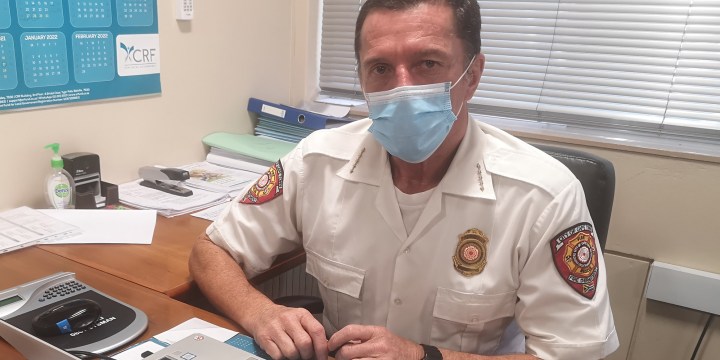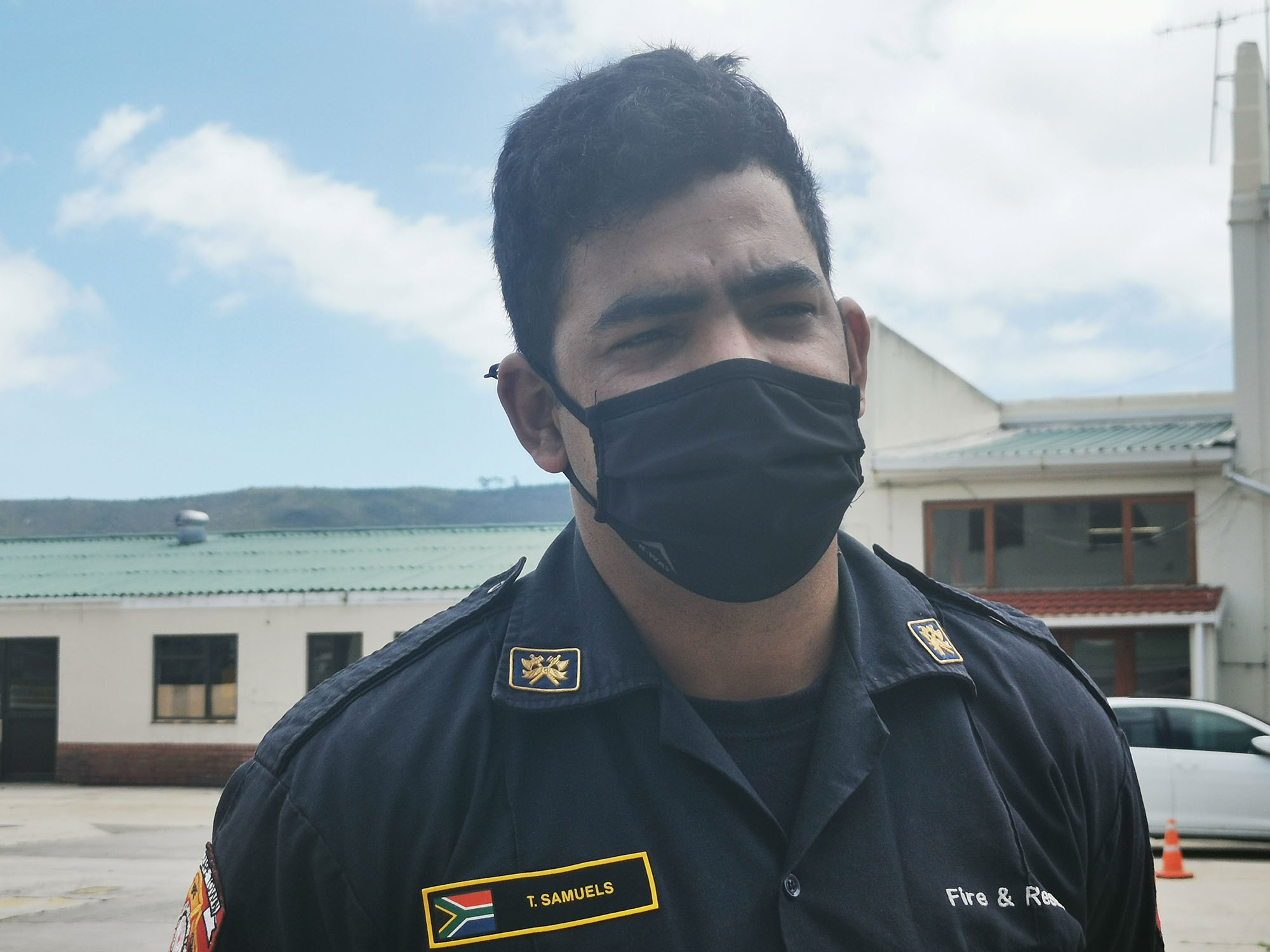OUR BURNING ASSEMBLY: INTERVIEW
Cape Town fire chief Ian Schnetler: From a rookie with dreams of adventure to a leader with the burden of responsibility

The role of chief fire officer is one that comes with a host of responsibilities, including managing a large staff complement, coordinating different shift systems, and monitoring high-profile events such as the recent Parliament fire. For Ian Schnetler, chief fire officer for the City of Cape Town, the main objective is not only to respond to fires effectively, but also to prevent them from happening in the first place.
On New Year’s Eve in 1979, Ian Schnetler, current chief fire officer of Cape Town, attended the scene of his first fire. The memory of that incident – a double-storey house fire in Higgovale – still remains with him. Just an hour before the call out, he had been on the phone to his mother, receiving his matric results.
“I’d written my matric, and we didn’t get a newspaper delivered at the fire station. So, after 12 o’clock, I had to phone my mom to go check the newspapers to see what my matric mark was, and if I’d passed,” said Schnetler.
Most firefighters remember their first encounters, said Schnetler. He remembers his first motor vehicle crash, first death, the first body he had to recover.
“You’ll remember all those firsts,” he said. “But as your career [progresses], some of those ‘after ones’ just fade in memory, because you’re busy with it all the time.”
Schnetler began his service at Roeland Street Fire Station in December 1979, about a week after finishing matric. Today, he is in his fifteenth year as chief fire officer of City of Cape Town Fire and Rescue service.

Cape Town firefighter Tashreeq Samuels said good training left him well prepared for the fire at Parliament. See article here (Photo: Suné Payne)
“I think it was just the need to try and make a difference … and also to be able to do the exciting stuff,” said Schnetler, explaining why he joined the service. The “exciting stuff” turned out to be about 1o% of the job, he added. The rest was ensuring that he was able to do it properly.
As a young recruit, Schnetler was guided by a number of experienced officers, while capitalising on opportunities to study and complete courses.
“I’ve just managed… to use my opportunities to the best of my ability, and had the privilege of being afforded that opportunity to be who I am now,” he said.
The Cape Town Fire and Rescue service was recently commended by the presiding officers of Parliament for their quick response time to the Parliament fire. Schnetler credited the efficient coordinated response to the Parliament fire to the service’s incident command system – a system that enables it to bring in extra resources which can be deployed to to manage an incident as it escalates.

Parliamentary fire (Picture courtesy Parliament)
“It’s testament to that, in terms of that operation working well, that there was no firefighter injured on that call at all,” said Schnetler.
The Parliament fire demonstrated to South Africans the types of hazard that firefighters face on a daily basis. In managing the risks that come with the job, ongoing training is very important, said Schnetler. Firefighters’ “situational awareness” must be at the highest level while in the field, where they are often surrounded by smoke and darkness, he said.
The first training course that Schnetler completed, in 1980, was a three-month experience, crammed with information on hydraulics, maths and physics.
“You were practically drilling in the yard every single day, and you came out of there a very accomplished recruit,” said Schnetler.
Managing pressure
Firefighters are provided with adequate time off, usually having between two and four days to rest on a regular basis. However, their support structures, provided by family and friends, are the most important in ensuring their recovery from intense shifts, said Schnetler.
“They have got adequate time to recover from what they’ve seen, because there are some horrific incidents that they do go to,” he said, adding that trauma counselling is provided for those staff who need it.
Those looking to become firefighters need to be prepared to put their life on the line. “You need to have a very strong sense of self-discipline … and then also not to look at this as a job, but to look at it as a profession or a calling,” he said. “[Y]ou’re not here to serve yourself. You need to join to serve others.”
Schnetler’s own methods of managing the pressures of his career include working around the home, cycling and getting out into the wilderness now and again.
“It’s not only myself at the end of the day. We’ve got a fire management team, my other district heads and the sections of the fire service – we are part of a team,” he said. “But it is pressurised, particularly if you get a high-profile incident like [the Parliament fire].”
The complex parts of the job include overseeing a large staff complement, managing different shift systems and keeping up with day-to-day admin, he said.
“I would love to be more operationally involved, but as a chief fire officer you’ve got to also make sure that all the administrative stuff is sorted out. That takes up a lot of your time,” he said.

Parliament in Cape Town continues to burn on January 03, 2022 in Cape Town, South Africa. It is reported that the roof of the National Assembly building is on fire again. (Images by Gallo Images/ER Lombard)
It is rare to see Schnetler taking an active part in firefighting, as his priority is usually to act as a bridge between the fire crews and “higher ups”, said Llewellyen de Lange, a firefighter at the Goodwood Fire Station.
“The time that we have met him on the fire ground, I’ve never seen him stand back,” said De Lange. “When he does have the time, or when he does pitch up, then he puts in a hand if it’s needed.”
At high-profile incidents, such as the Parliament fire, Schnetler assists in providing a line of communication between the management of the fire and the media, said Jacques Swanepoel, another firefighter at the Goodwood station.
Managing Cape Town
The fire safety officers under Schnetler’s command are very strict when it comes to managing events in the Cape Town metro. Their inspections ensure fire safety compliance and limitations on the number of people that occupy a space, said Schnetler.
“We have had many complaints and queries from event organisers that are not happy with our stance on it… but we have to maintain those standards,” he stated. “[Y]ou can’t play with people’s lives.”
Many of the highlights of Schnetler’s career are opportunities he has had to meet and learn from other firefighters around the country and the world. In 2010, he travelled to Munich – the 2006 host of the FIFA World Cup – to learn from their experience of managing the competition.
The trip was not only a learning experience, but an opportunity to realise that the Cape Town Fire and Rescue Service, which some might have considered to be behind the rest of the world, was in fact ahead of developed countries in some areas, said Schnetler.
“Participating in the 1996 Firefighters World Games in Canada, and going over with a squad of our staff to that, those are highlights,” said Schnetler. “Then just generally, improvements that we’ve made in the fire service in terms of equipment and uniform.”
Schnetler stressed the importance of providing education and awareness around fires. In this sense, his main aim is to reduce the number of fires occurring in the community – an objective he believes any fire service in any part of the world should strive towards.
“I’ve told my staff sometimes that if we could have one day of not responding to fire in the City of Cape Town, then I will resign … because then I’ve done my job as a fire chief,” said Schnetler. “Yes, we’ve got to go and put out fires when they happen, but the ultimate objective is to prevent them in the first place.” DM


















 Become an Insider
Become an Insider
So fantastic in these days of absolute unaccountability of government officials , to read about the Cape Town fire chief and his dedication to his job- well done indeed to you sir- you a re a credit to the community and the country!
I second that !
And the whole team. Bravo.
Hear hear.
Well done Ian